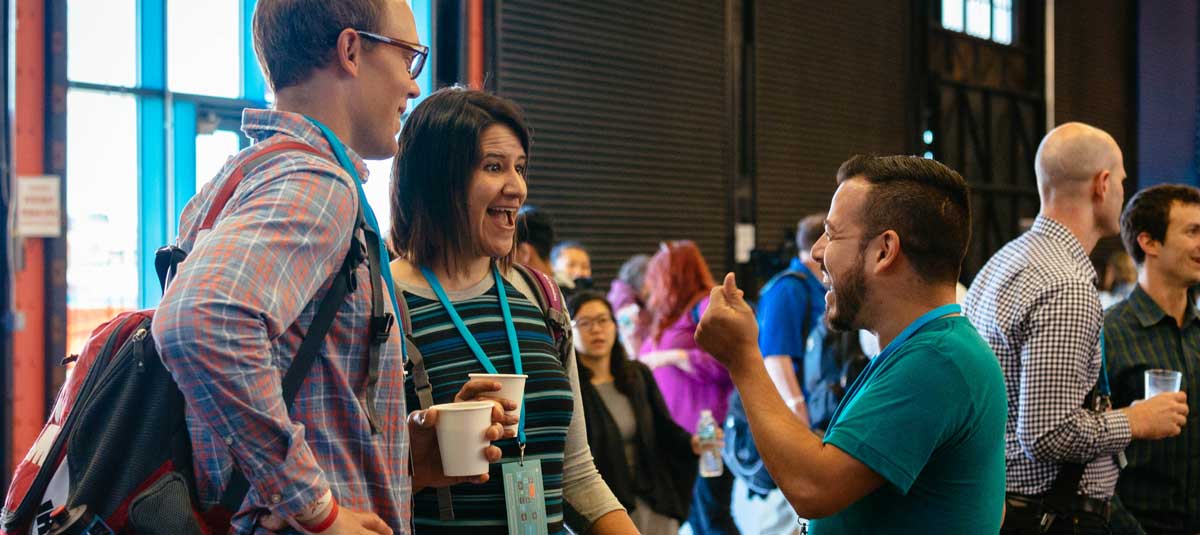How to Convince Your Boss to Send You to a Conference

Conferences are an important way to learn new skills and strategies and make new connections. For nonprofit professionals specifically, conferences can expose you to new funding opportunities, innovative program models, colleagues working in your cause sector, and much more.
The trouble is that most of us don’t have the authority or freedom to send ourselves to conferences. That decision usually lies with a manager. To attend a conference, you need to do your research, present the benefits, and simply make it easy for your boss to say “yes.” Below, we break down the process so you can start planning your next business trip.
Start the Conversation
Once you spot an event you think would be valuable for you and your organization, your first step is to make sure it isn’t going to pose any obvious and insurmountable problems. For example, if a conference takes place the same week as an event you’re running, you’re probably barking up the wrong tree. Take a look at your calendar and see how the event will fit into your time.
With this background information, you can start planning your proposal. The first question you need to answer is “who is the decision-maker?” This may be your direct manager, the head of your department, or, at a small organization, the executive director. If you haven’t asked to attend a conference before, you can ask what the process is or mention that you think an upcoming event would be a good opportunity.
Remember to present the conference as an opportunity for your organization at every point in the conversation. It’s your job to illustrate the value this trip will deliver. Set up a time with your decision-maker to talk about why you want to attend the event. Then make sure you do your homework.
Show the Value
Travel and conferences cost money, and at nonprofits, every dollar serves a purpose. If you want to attend a conference, you need to illustrate all the ways it will make you more successful in your role, and your organization more successful in your mission.
Here are a few benefits you can focus on.
Knowledge and Strategy
At the core, conferences are about gathering new information that makes you better at your job. The approval of decision-makers often depends on clearly showing the valuable skills and strategies you will learn at this event.
Research the conference to find out what topics will be discussed, what problems they seek to solve, and how attendees experience the programming. Write down several concrete skills or ideas you will take away from the event, such as:
- How different generations communicate and how nonprofits must adapt
- How to use your donor database or other tools more efficiently and effectively
- Strategies to grow a revenue stream your organization has been struggling with
Meet Funders, Entrepreneurs, and Social Sector Leaders at the Collaborative
Connections With Individuals and Organizations
Another benefit of professional conferences is that they bring together many people with similar interests and missions. This is especially valuable if your nonprofit is young or doesn’t have a strong local community of related organizations. What’s more, you never know when you’re going to run into your nonprofit’s next partner, corporate sponsor, or new hire.
Study the people and organizations attending your event and identify a few key connections you will make there, such as:
- Another organization that succeeded while facing similar challenges to yours
- A sector leader invested in your cause
- A researcher or academic with unique insights into your mission
Existing Relationships and Bonus Opportunities
As exciting as it is to make new connections at conferences and events, this is also a valuable opportunity to nurture or rekindle existing relationships. For instance, your colleague might have had a promising exchange with a potential corporate partner, but their conversation went cold or your colleague moved on to another job. If this older contact will be at the event, or even in the same city, note this opportunity to reconnect as an added benefit to attendance.
Perhaps your organization is trying to recruit a new hire that will be at the event or in the area. Explain that you could make it a priority to connect with this prospect and get them excited about your mission.
These existing relationships and bonus opportunities won’t be enough to convince most decision-makers by themselves, but they could be that little bit of extra value that shows the trip is worth the investment.
Make a Plan
To show that you’ve really thought through this proposal, spend some time researching what the logistics and costs will entail. Can you drive to the event or will you need to fly? What other expenses will there be? Go the extra mile by seeing how this conference would affect your other responsibilities and projects. Identify what actions you can take to make the trip go smoothly.
As you wrap up your proposal, present a suggested timeline for purchasing a conference ticket, securing a place to stay, and debriefing your team with what you learned. Invite your decision-maker to ask questions or if they see any other connections you could make at the event. Showing that your attendance will benefit the whole organization is the best way to convince your boss to send you to the conference you’ve been dying to experience.
Check out these slides that illustrate the value of the Collaborative, coming to Boston June 13 to 15. Use this as an example of how to structure a conference proposal or show your boss what your organization will gain from the Collaborative.

Save the Date for the 2018 Collaborative



